The Cambridge History of China. Vol. 06. Alien Regimes and Border States, 907-1368
Подождите немного. Документ загружается.

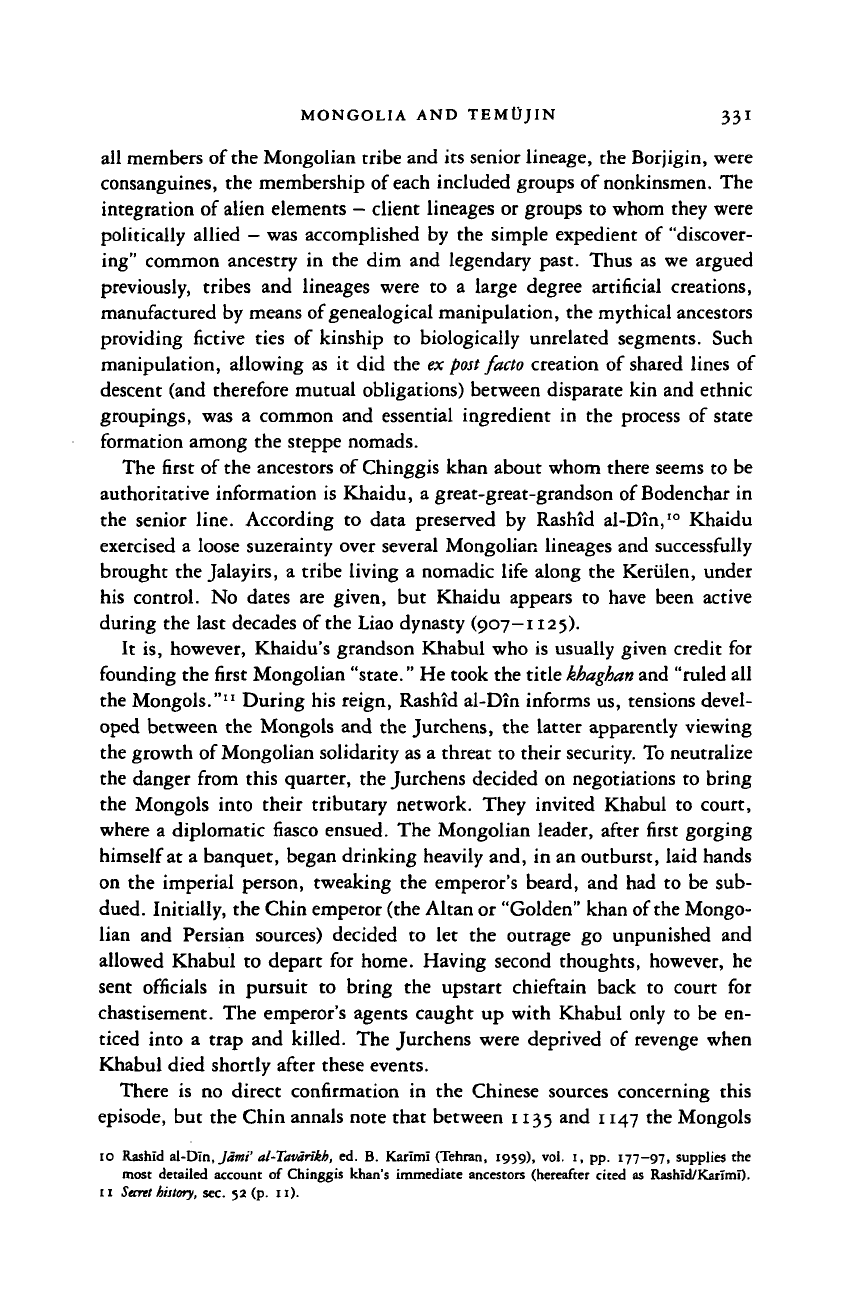
MONGOLIA AND TEMOjIN 331
all members of
the
Mongolian tribe and its senior lineage, the Borjigin, were
consanguines, the membership of each included groups of nonkinsmen. The
integration of alien elements - client lineages or groups to whom they were
politically allied - was accomplished by the simple expedient of "discover-
ing" common ancestry in the dim and legendary past. Thus as we argued
previously, tribes and lineages were to a large degree artificial creations,
manufactured by means of genealogical manipulation, the mythical ancestors
providing fictive ties of kinship to biologically unrelated segments. Such
manipulation, allowing as it did the
ex post facto
creation of shared lines of
descent (and therefore mutual obligations) between disparate kin and ethnic
groupings, was a common and essential ingredient in the process of state
formation among the steppe nomads.
The first of the ancestors of Chinggis khan about whom there seems to be
authoritative information is Khaidu, a great-great-grandson of Bodenchar in
the senior line. According to data preserved by Rashid al-Din,
IO
Khaidu
exercised a loose suzerainty over several Mongolian lineages and successfully
brought the Jalayirs, a tribe living a nomadic life along the Keriilen, under
his control. No dates are given, but Khaidu appears to have been active
during the last decades of the Liao dynasty (907-1125).
It is, however, Khaidu's grandson Khabul who is usually given credit for
founding the first Mongolian "state." He took the title
khaghan
and "ruled all
the Mongols."
11
During his reign, Rashid al-Din informs us, tensions devel-
oped between the Mongols and the Jurchens, the latter apparently viewing
the growth of Mongolian solidarity as a threat to their security. To neutralize
the danger from this quarter, the Jurchens decided on negotiations to bring
the Mongols into their tributary network. They invited Khabul to court,
where a diplomatic fiasco ensued. The Mongolian leader, after first gorging
himself at a banquet, began drinking heavily and, in an outburst, laid hands
on the imperial person, tweaking the emperor's beard, and had to be sub-
dued. Initially, the Chin emperor (the Altan or "Golden" khan of
the
Mongo-
lian and Persian sources) decided to let the outrage go unpunished and
allowed Khabul to depart for home. Having second thoughts, however, he
sent officials in pursuit to bring the upstart chieftain back to court for
chastisement. The emperor's agents caught up with Khabul only to be en-
ticed into a trap and killed. The Jurchens were deprived of revenge when
Khabul died shortly after these events.
There is no direct confirmation in the Chinese sources concerning this
episode, but the Chin annals note that between 1135 and 1147 the Mongols
10 Rashid al-Din, Jam? al-Tavarikh, ed. B. Karlml (Tehran, 1959), vol. 1, pp. 177-97, supplies the
most detailed account of Chinggis khan's immediate ancestors (hereafter cited as Rashld/Katimi).
11
Secret
history,
sec. 52 (p. 11).
Cambridge Histories Online © Cambridge University Press, 2008
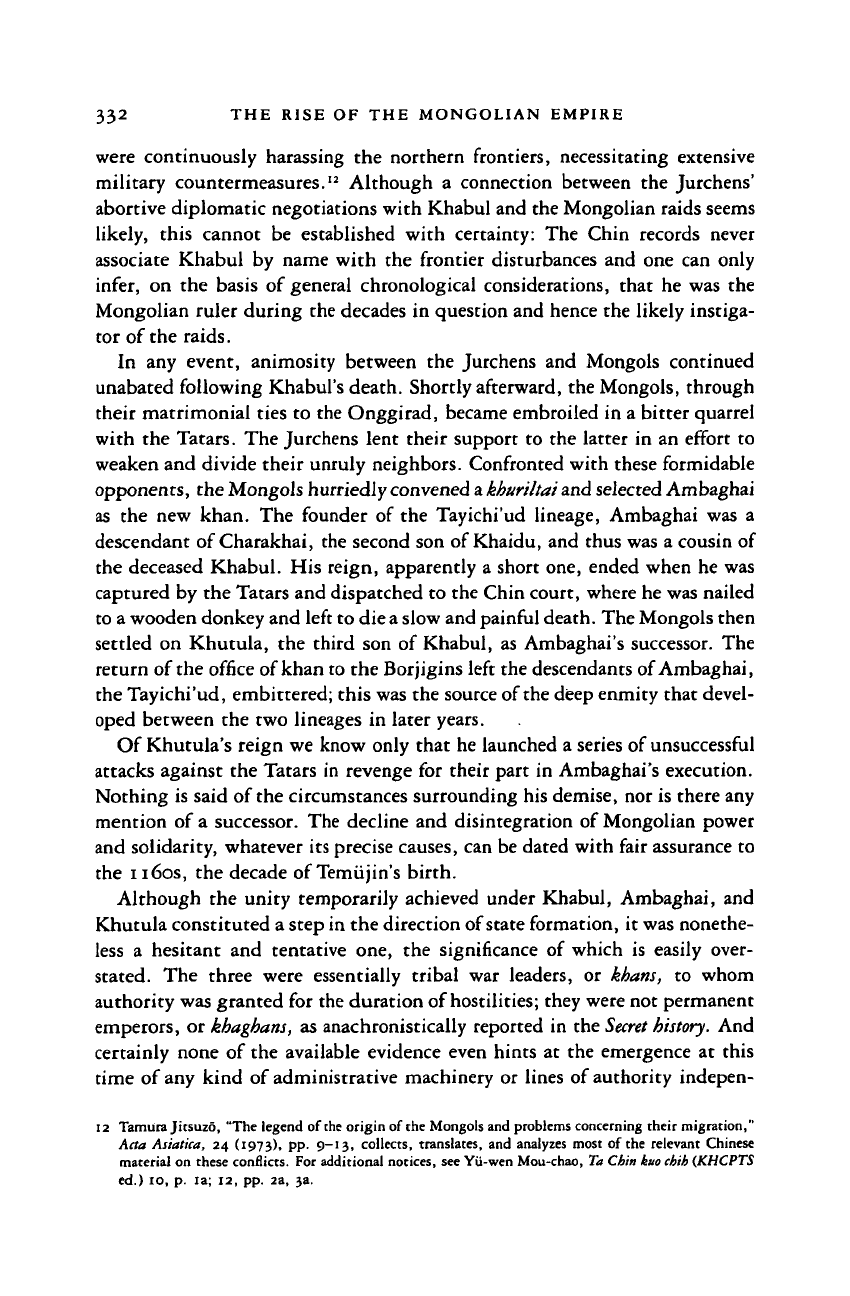
332 THE RISE OF THE MONGOLIAN EMPIRE
were continuously harassing the northern frontiers, necessitating extensive
military countermeasures.
12
Although a connection between the Jurchens'
abortive diplomatic negotiations with Khabul and the Mongolian raids seems
likely, this cannot be established with certainty: The Chin records never
associate Khabul by name with the frontier disturbances and one can only
infer, on the basis of general chronological considerations, that he was the
Mongolian ruler during the decades in question and hence the likely instiga-
tor of the raids.
In any event, animosity between the Jurchens and Mongols continued
unabated following Khabul's death. Shortly afterward, the Mongols, through
their matrimonial ties to the Onggirad, became embroiled in a bitter quarrel
with the Tatars. The Jurchens lent their support to the latter in an effort to
weaken and divide their unruly neighbors. Confronted with these formidable
opponents, the Mongols hurriedly convened a
khuriltai
and selected Ambaghai
as the new khan. The founder of the Tayichi'ud lineage, Ambaghai was a
descendant of Charakhai, the second son of Khaidu, and thus was a cousin of
the deceased Khabul. His reign, apparently a short one, ended when he was
captured by the Tatars and dispatched to the Chin court, where he was nailed
to
a
wooden donkey and left to die
a
slow and painful death. The Mongols then
settled on Khutula, the third son of Khabul, as Ambaghai's successor. The
return of the office of khan to the Borjigins left the descendants of Ambaghai,
the Tayichi'ud, embittered; this was the source of the deep enmity that devel-
oped between the two lineages in later years.
Of Khutula's reign we know only that he launched a series of unsuccessful
attacks against the Tatars in revenge for their part in Ambaghai's execution.
Nothing is said of
the
circumstances surrounding his demise, nor is there any
mention of a successor. The decline and disintegration of Mongolian power
and solidarity, whatever its precise causes, can be dated with fair assurance to
the 1160s, the decade of Temiijin's birth.
Although the unity temporarily achieved under Khabul, Ambaghai, and
Khutula constituted a step in the direction of state formation, it was nonethe-
less a hesitant and tentative one, the significance of which is easily over-
stated. The three were essentially tribal war leaders, or khans, to whom
authority was granted for the duration of
hostilities;
they were not permanent
emperors, or
khaghans,
as anachronistically reported in the
Secret
history.
And
certainly none of the available evidence even hints at the emergence at this
time of any kind of administrative machinery or lines of authority indepen-
12 Tamura Jitsuzo, "The legend of the origin of the Mongols and problems concerning their migration,"
Acta Asiatica, 24 (1973), pp. 9-13, collects, translates, and analyzes most of the relevant Chinese
material on these conflicts. For additional notices, see Yii-wen Mou-chao, Ta Chin
kuo chih
(KHCPTS
ed.) 10, p. la; 12, pp. 2a, 3a.
Cambridge Histories Online © Cambridge University Press, 2008
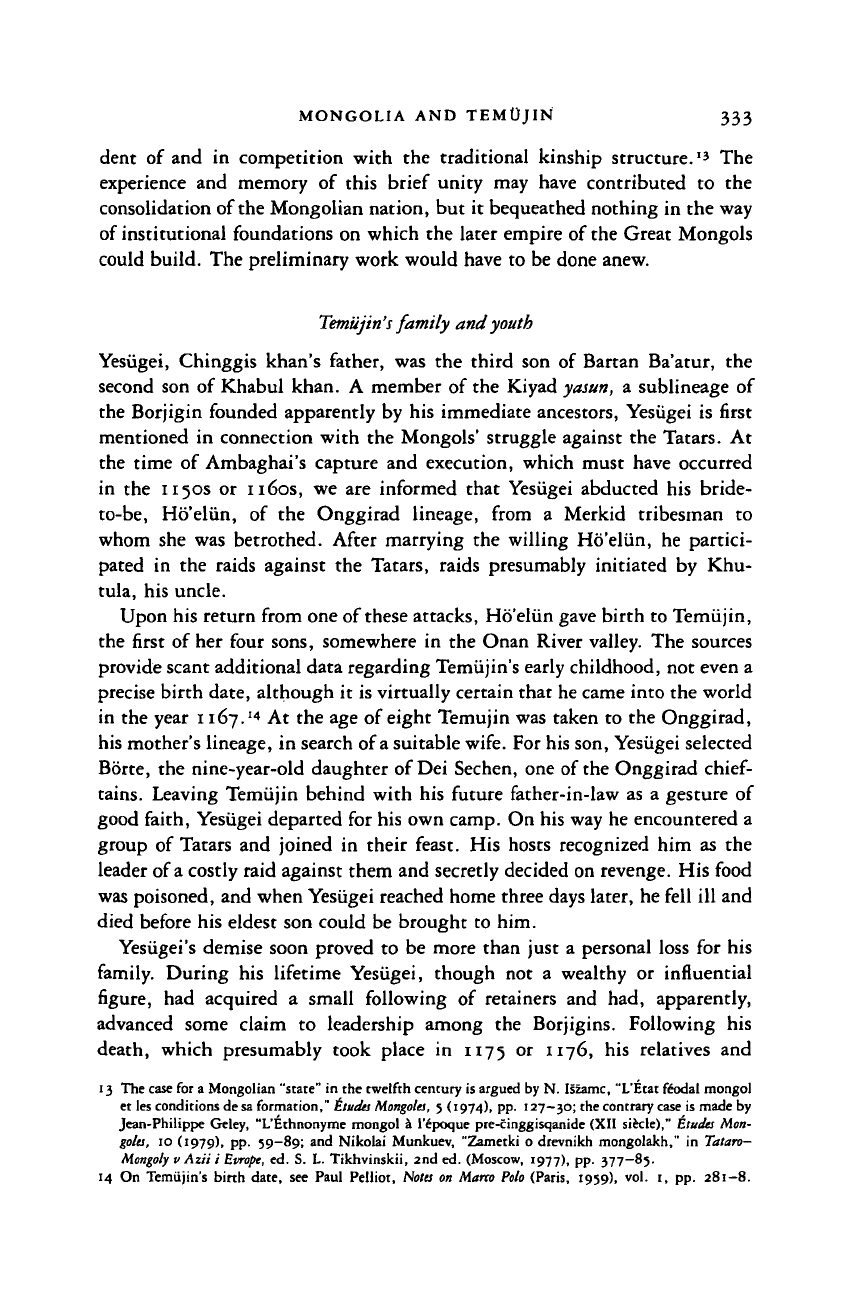
MONGOLIA AND TEMOjIN 333
dent of and in competition with the traditional kinship structure.
13
The
experience and memory of this brief unity may have contributed to the
consolidation of the Mongolian nation, but it bequeathed nothing in the way
of institutional foundations on which the later empire of the Great Mongols
could build. The preliminary work would have to be done anew.
Temiijin's
family and youth
Yesiigei, Chinggis khan's father, was the third son of Bartan Ba'atur, the
second son of Khabul khan. A member of the Kiyad yasun, a sublineage of
the Borjigin founded apparently by his immediate ancestors, Yesiigei is first
mentioned in connection with the Mongols' struggle against the Tatars. At
the time of Ambaghai's capture and execution, which must have occurred
in the 1150s or 1160s, we are informed that Yesiigei abducted his bride-
to-be,
Ho'eliin, of the Onggirad lineage, from a Merkid tribesman to
whom she was betrothed. After marrying the willing Ho'eliin, he partici-
pated in the raids against the Tatars, raids presumably initiated by Khu-
tula, his uncle.
Upon his return from one of these attacks, Ho'eliin gave birth to Temiijin,
the first of her four sons, somewhere in the Onan River valley. The sources
provide scant additional data regarding Temiijin's early childhood, not even a
precise birth date, although it is virtually certain that he came into the world
in the year 1167.
14
At the age of eight Temujin was taken to the Onggirad,
his mother's lineage, in search of
a
suitable wife. For his son, Yesiigei selected
Borte, the nine-year-old daughter of Dei Sechen, one of the Onggirad
chief-
tains.
Leaving Temujin behind with his future father-in-law as a gesture of
good faith, Yesiigei departed for his own camp. On his way he encountered a
group of Tatars and joined in their feast. His hosts recognized him as the
leader of a costly raid against them and secretly decided on revenge. His food
was poisoned, and when Yesiigei reached home three days later, he fell ill and
died before his eldest son could be brought to him.
Yesiigei's demise soon proved to be more than just a personal loss for his
family. During his lifetime Yesiigei, though not a wealthy or influential
figure, had acquired a small following of retainers and had, apparently,
advanced some claim to leadership among the Borjigins. Following his
death, which presumably took place in 1175 or 1176, his relatives and
13 The case for a Mongolian "state" in the twelfth century is argued by N. Iszamc, "L'Etat ftodal mongol
et les conditions de sa formation," fctuda
Mongoles,
5 (1974), pp. 127—30; the contrary case is made by
Jean-Philippe Geley, "L'Ethnonyme mongol a l'epoque pre-cinggisqanide (XII siecle)," ttudts Mon-
golts, 10 (1979), pp. 59-89; and Nikolai Munkuev, "Zamerki o drevnikh mongolakh," in
Tataro—
Mmgoly v Azii i
Evrope,
ed. S. L. Tikhvinskii, 2nd ed. (Moscow, 1977), pp. 377—85.
14 On Temiijin's birth date, see Paul Pelliot, Notes on Marco Polo (Paris, 1959), vol. 1, pp. 281—8.
Cambridge Histories Online © Cambridge University Press, 2008
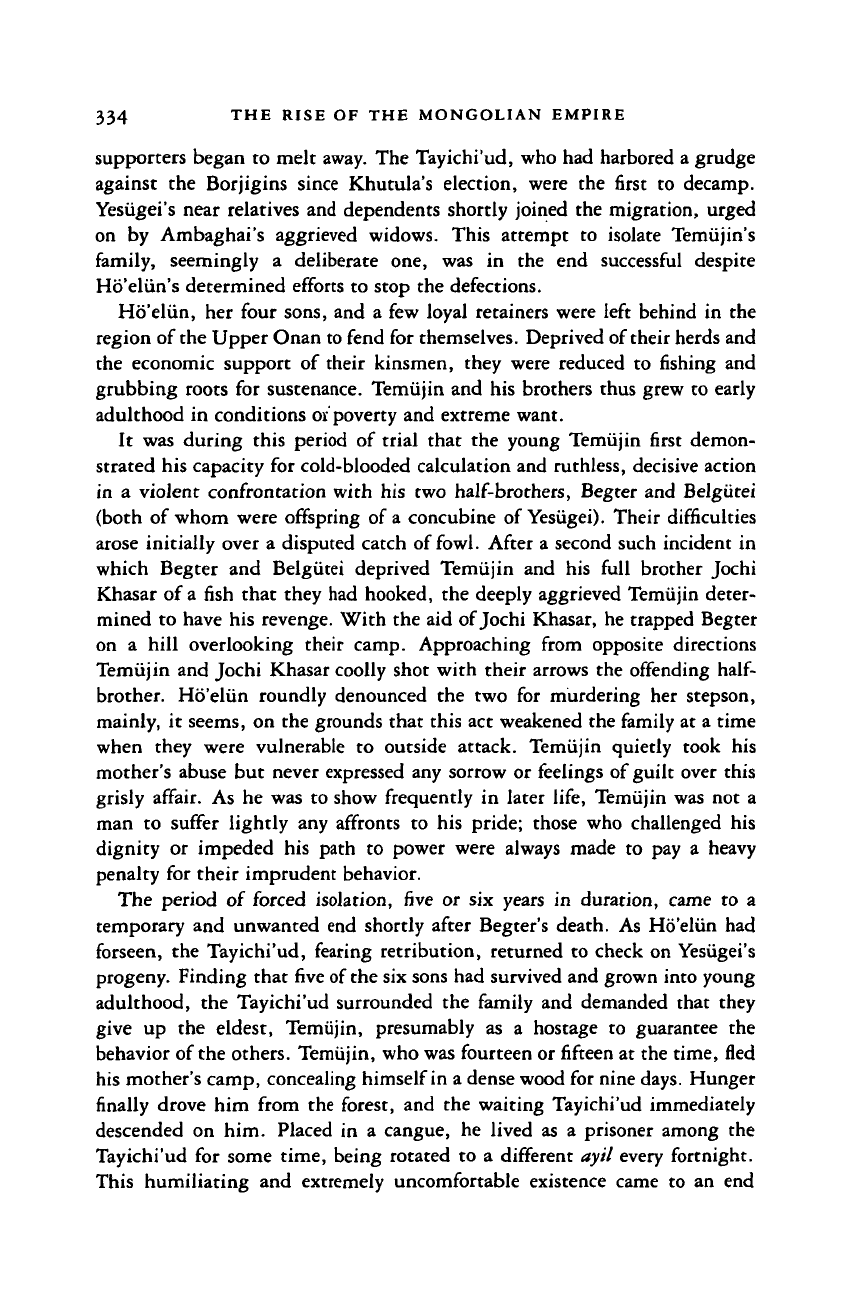
334
THE RISE OF THE
MONGOLIAN EMPIRE
supporters began to melt away. The Tayichi'ud, who had harbored a grudge
against the Borjigins since Khutula's election, were the first to decamp.
Yesiigei's near relatives and dependents shortly joined the migration, urged
on by Ambaghai's aggrieved widows. This attempt to isolate Temiijin's
family, seemingly a deliberate one, was in the end successful despite
Ho'eliin's determined efforts to stop the defections.
Ho'eliin, her four sons, and a few loyal retainers were left behind in the
region of the Upper Onan to fend for themselves. Deprived of their herds and
the economic support of their kinsmen, they were reduced to fishing and
grubbing roots for sustenance. Temiijin and his brothers thus grew to early
adulthood in conditions or poverty and extreme want.
It was during this period of trial that the young Temiijin first demon-
strated his capacity for cold-blooded calculation and ruthless, decisive action
in a violent confrontation with his two half-brothers, Begter and Belgiitei
(both of whom were offspring of a concubine of
Yestigei).
Their difficulties
arose initially over a disputed catch of fowl. After a second such incident in
which Begter and Belgiitei deprived Temiijin and his full brother Jochi
Khasar of a fish that they had hooked, the deeply aggrieved Temiijin deter-
mined to have his revenge. With the aid of Jochi Khasar, he trapped Begter
on a hill overlooking their camp. Approaching from opposite directions
Temiijin and Jochi Khasar coolly shot with their arrows the offending
half-
brother. Ho'eliin roundly denounced the two for murdering her stepson,
mainly, it seems, on the grounds that this act weakened the family at a time
when they were vulnerable to outside attack. Temiijin quietly took his
mother's abuse but never expressed any sorrow or feelings of guilt over this
grisly affair. As he was to show frequently in later life, Temiijin was not a
man to suffer lightly any affronts to his pride; those who challenged his
dignity or impeded his path to power were always made to pay a heavy
penalty for their imprudent behavior.
The period of forced isolation, five or six years in duration, came to a
temporary and unwanted end shortly after Begter's death. As Ho'eliin had
forseen, the Tayichi'ud, fearing retribution, returned to check on Yesiigei's
progeny. Finding that five of the six sons had survived and grown into young
adulthood, the Tayichi'ud surrounded the family and demanded that they
give up the eldest, Temiijin, presumably as a hostage to guarantee the
behavior of the others. Temiijin, who was fourteen or
fifteen
at the time, fled
his mother's camp, concealing himself
in
a dense wood for nine
days.
Hunger
finally drove him from the forest, and the waiting Tayichi'ud immediately
descended on him. Placed in a cangue, he lived as a prisoner among the
Tayichi'ud for some time, being rotated to a different ayil every fortnight.
This humiliating and extremely uncomfortable existence came to an end
Cambridge Histories Online © Cambridge University Press, 2008
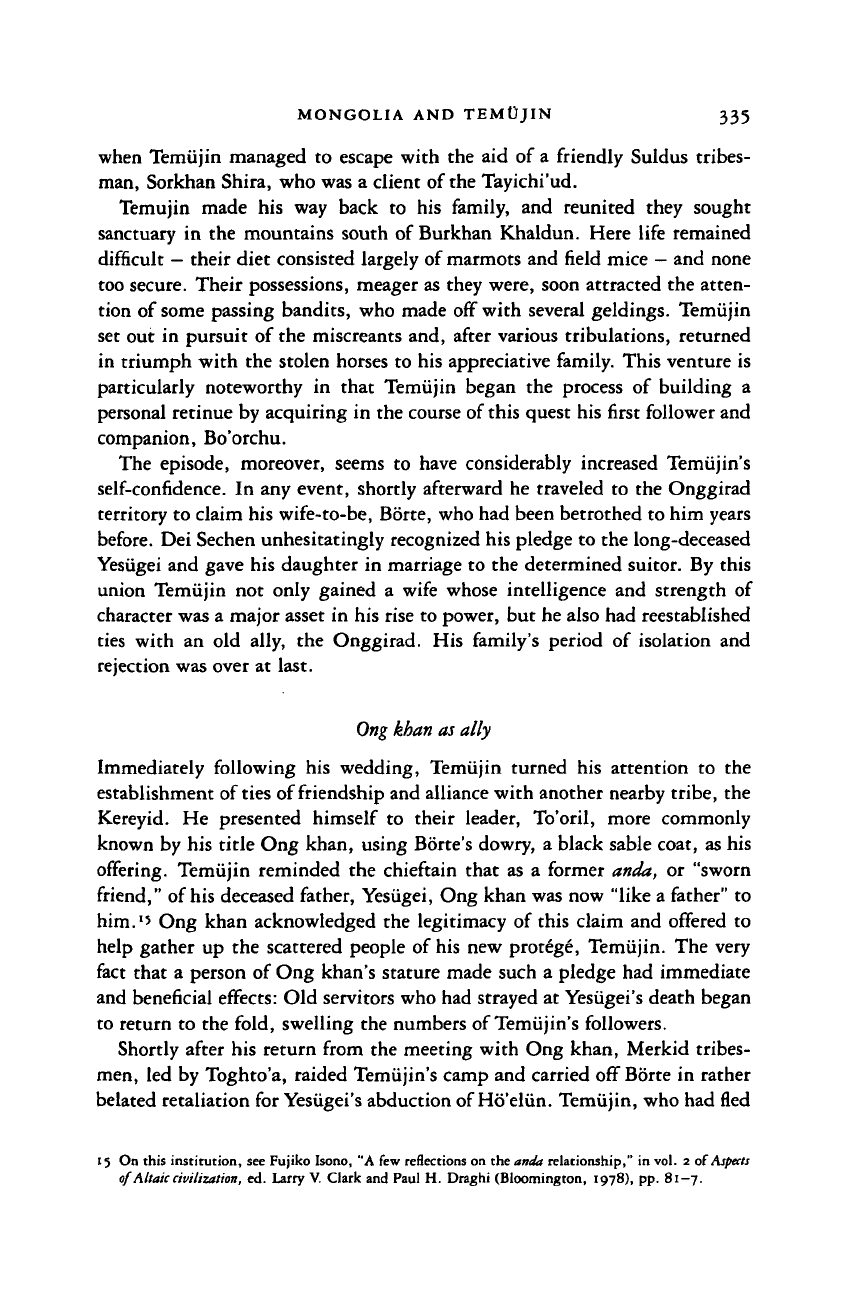
MONGOLIA AND TEMOjIN 335
when Temiijin managed to escape with the aid of a friendly Suldus tribes-
man, Sorkhan Shira, who was a client of the Tayichi'ud.
Temujin made his way back to his family, and reunited they sought
sanctuary in the mountains south of Burkhan Khaldun. Here life remained
difficult - their diet consisted largely of marmots and field mice - and none
too secure. Their possessions, meager as they were, soon attracted the atten-
tion of some passing bandits, who made off with several geldings. Temujin
set out in pursuit of the miscreants and, after various tribulations, returned
in triumph with the stolen horses to his appreciative family. This venture is
particularly noteworthy in that Temujin began the process of building a
personal retinue by acquiring in the course of this quest his first follower and
companion, Bo'orchu.
The episode, moreover, seems to have considerably increased Temiijin's
self-confidence. In any event, shortly afterward he traveled to the Onggirad
territory to claim his wife-to-be, Borte, who had been betrothed to him years
before. Dei Sechen unhesitatingly recognized his pledge to the long-deceased
Yesiigei and gave his daughter in marriage to the determined suitor. By this
union Temujin not only gained a wife whose intelligence and strength of
character was a major asset in his rise to power, but he also had reestablished
ties with an old ally, the Onggirad. His family's period of isolation and
rejection was over at last.
Ong
kban as ally
Immediately following his wedding, Temujin turned his attention to the
establishment of ties of friendship and alliance with another nearby tribe, the
Kereyid. He presented himself to their leader, To'oril, more commonly
known by his title Ong khan, using Borte's dowry, a black sable coat, as his
offering. Temujin reminded the chieftain that as a former anda, or "sworn
friend," of his deceased father, Yesiigei, Ong khan was now "like a father" to
him.
1
' Ong khan acknowledged the legitimacy of this claim and offered to
help gather up the scattered people of his new protege, Temujin. The very
fact that a person of Ong khan's stature made such a pledge had immediate
and beneficial effects: Old servitors who had strayed at Yesiigei's death began
to return to the fold, swelling the numbers of Temiijin's followers.
Shortly after his return from the meeting with Ong khan, Merkid tribes-
men, led by Toghto'a, raided Temiijin's camp and carried off Borte in rather
belated retaliation for Yesiigei's abduction of Ho'eliin. Temujin, who had fled
15 On this institution, see Fujiko Isono, "A few reflections on the anda relationship," in vol. 2 of
Aspects
of Altaic civilization, ed. Larry V. Clark and Paul H. Draghi (Bloomington, 1978), pp. 81—7.
Cambridge Histories Online © Cambridge University Press, 2008
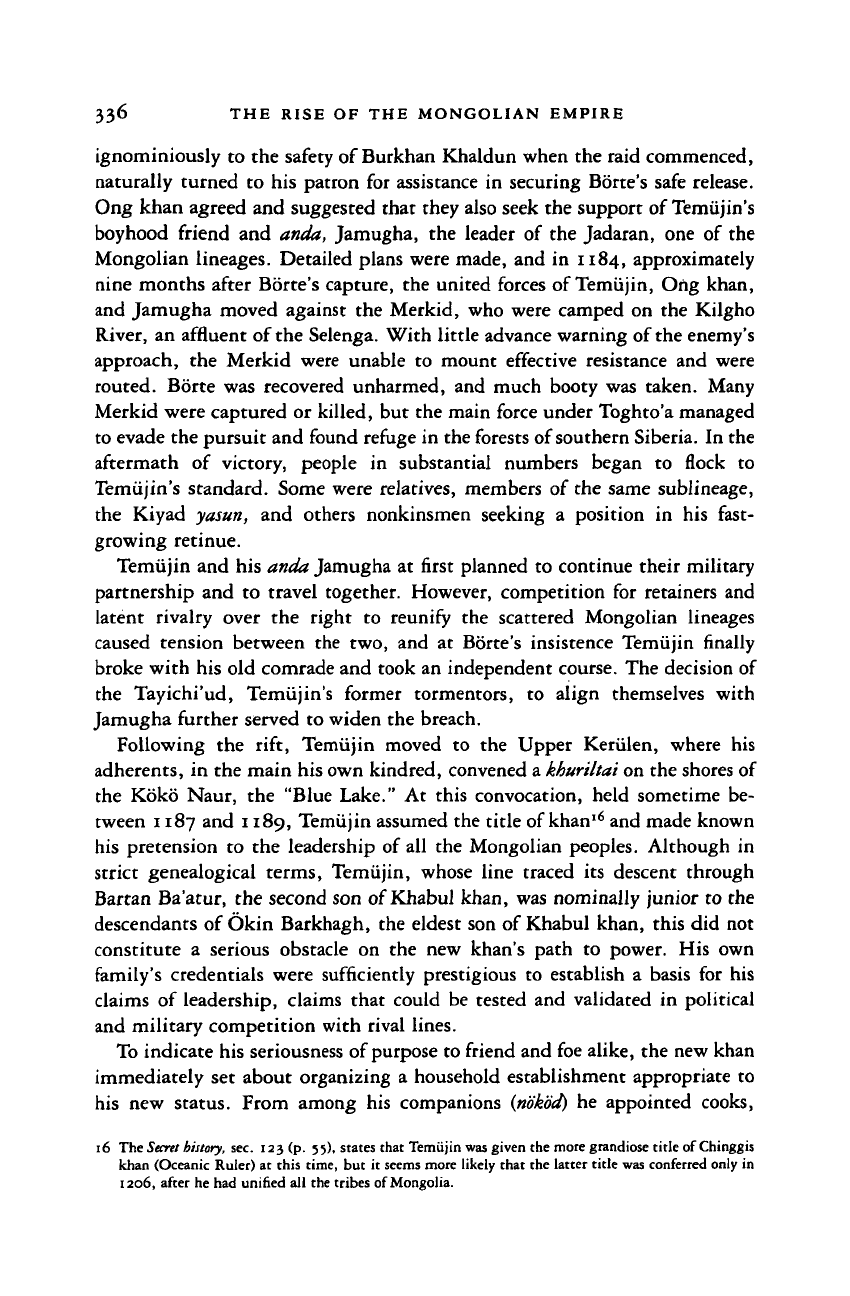
336 THE RISE OF THE MONGOLIAN EMPIRE
ignominiously to the safety of Burkhan Khaldun when the raid commenced,
naturally turned to his patron for assistance in securing Bone's safe release.
Ong khan agreed and suggested that they also seek the support of Temiijin's
boyhood friend and anda, Jamugha, the leader of the Jadaran, one of the
Mongolian lineages. Detailed plans were made, and in 1184, approximately
nine months after Borte's capture, the united forces of Temiijin, Ong khan,
and Jamugha moved against the Merkid, who were camped on the Kilgho
River, an affluent of the Selenga. With little advance warning of the enemy's
approach, the Merkid were unable to mount effective resistance and were
routed. Borte was recovered unharmed, and much booty was taken. Many
Merkid were captured or killed, but the main force under Toghto'a managed
to evade the pursuit and found refuge in the forests of southern Siberia. In the
aftermath of victory, people in substantial numbers began to flock to
Temiijin's standard. Some were relatives, members of the same sublineage,
the Kiyad yasun, and others nonkinsmen seeking a position in his fast-
growing retinue.
Temiijin and his
anda
Jamugha at first planned to continue their military
partnership and to travel together. However, competition for retainers and
latent rivalry over the right to reunify the scattered Mongolian lineages
caused tension between the two, and at Borte's insistence Temiijin finally
broke with his old comrade and took an independent course. The decision of
the Tayichi'ud, Temiijin's former tormentors, to align themselves with
Jamugha further served to widen the breach.
Following the rift, Temiijin moved to the Upper Keriilen, where his
adherents, in the main his own kindred, convened a
khuriltai
on the shores of
the Koko Naur, the "Blue Lake." At this convocation, held sometime be-
tween 1187 and 1189, Temiijin assumed the title of khan
16
and made known
his pretension to the leadership of all the Mongolian peoples. Although in
strict genealogical terms, Temiijin, whose line traced its descent through
Bartan Ba'atur, the second son of Khabul khan, was nominally junior to the
descendants of Okin Barkhagh, the eldest son of Khabul khan, this did not
constitute a serious obstacle on the new khan's path to power. His own
family's credentials were sufficiently prestigious to establish a basis for his
claims of leadership, claims that could be tested and validated in political
and military competition with rival lines.
To indicate his seriousness of purpose to friend and foe alike, the new khan
immediately set about organizing a household establishment appropriate to
his new status. From among his companions
(nokod)
he appointed cooks,
16 The
Secret
history, sec. 123 (p. 55), states that Temiijin was given the more grandiose title of Chinggis
khan (Oceanic Ruler) at this time, but it seems more likely that the latter title was conferred only in
1206, after he had unified all the tribes of Mongolia.
Cambridge Histories Online © Cambridge University Press, 2008
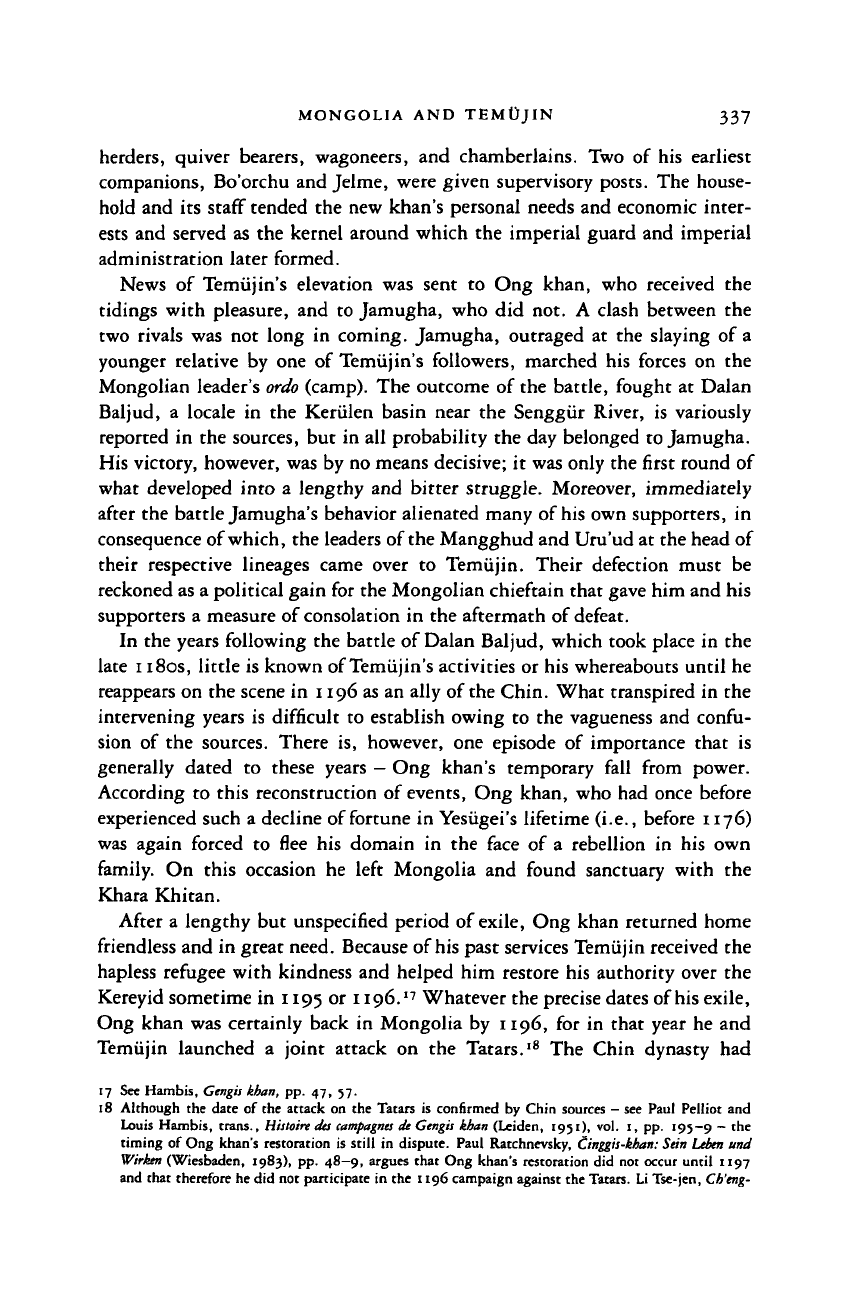
MONGOLIA AND TEMOjIN 337
herders, quiver bearers, wagoneers, and chamberlains. Two of his earliest
companions, Bo'orchu and Jelme, were given supervisory posts. The house-
hold and its staff tended the new khan's personal needs and economic inter-
ests and served as the kernel around which the imperial guard and imperial
administration later formed.
News of Temiijin's elevation was sent to Ong khan, who received the
tidings with pleasure, and to Jamugha, who did not. A clash between the
two rivals was not long in coming. Jamugha, outraged at the slaying of a
younger relative by one of Temiijin's followers, marched his forces on the
Mongolian leader's
ordo
(camp). The outcome of the battle, fought at Dalan
Baljud, a locale in the Keriilen basin near the Senggiir River, is variously
reported in the sources, but in all probability the day belonged to Jamugha.
His victory, however, was by no means decisive; it was only the first round of
what developed into a lengthy and bitter struggle. Moreover, immediately
after the battle Jamugha's behavior alienated many of his own supporters, in
consequence of which, the leaders of the Mangghud and Uru'ud at the head of
their respective lineages came over to Temiijin. Their defection must be
reckoned as a political gain for the Mongolian chieftain that gave him and his
supporters a measure of consolation in the aftermath of defeat.
In the years following the battle of Dalan Baljud, which took place in the
late 1180s, little is known of Temiijin's activities or his whereabouts until he
reappears on the scene in 1196 as an ally of the Chin. What transpired in the
intervening years is difficult to establish owing to the vagueness and confu-
sion of the sources. There is, however, one episode of importance that is
generally dated to these years
—
Ong khan's temporary fall from power.
According to this reconstruction of events, Ong khan, who had once before
experienced such a decline of fortune in Yesiigei's lifetime (i.e., before 1176)
was again forced to flee his domain in the face of a rebellion in his own
family. On this occasion he left Mongolia and found sanctuary with the
Khara Khitan.
After a lengthy but unspecified period of exile, Ong khan returned home
friendless and in great need. Because of his past services Temujin received the
hapless refugee with kindness and helped him restore his authority over the
Kereyid sometime in 1195 or 1196.
17
Whatever the precise dates of his exile,
Ong khan was certainly back in Mongolia by 1196, for in that year he and
Temujin launched a joint attack on the Tatars.
18
The Chin dynasty had
17 See Hambis, Cengis khan, pp. 47, 57.
18 Although the date of the attack on the Tatars is confirmed by Chin sources - see Paul Pelliot and
Louis Hambis, trans., Histoin da campagna de Gengis khan (Leiden, 1951), vol. 1, pp. 195-9
—
tne
timing of Ong khan's restoration is still in dispute. Paul Ratchnevsky, dnggis-khan: Sein
Leben
und
Wirken (Wiesbaden, 1983), pp. 48-9, argues that Ong khan's restoration did not occur until 1197
and that therefore he did not participate in the 1196 campaign against the Tatars. Li Tse-jen, Ch'eng-
Cambridge Histories Online © Cambridge University Press, 2008
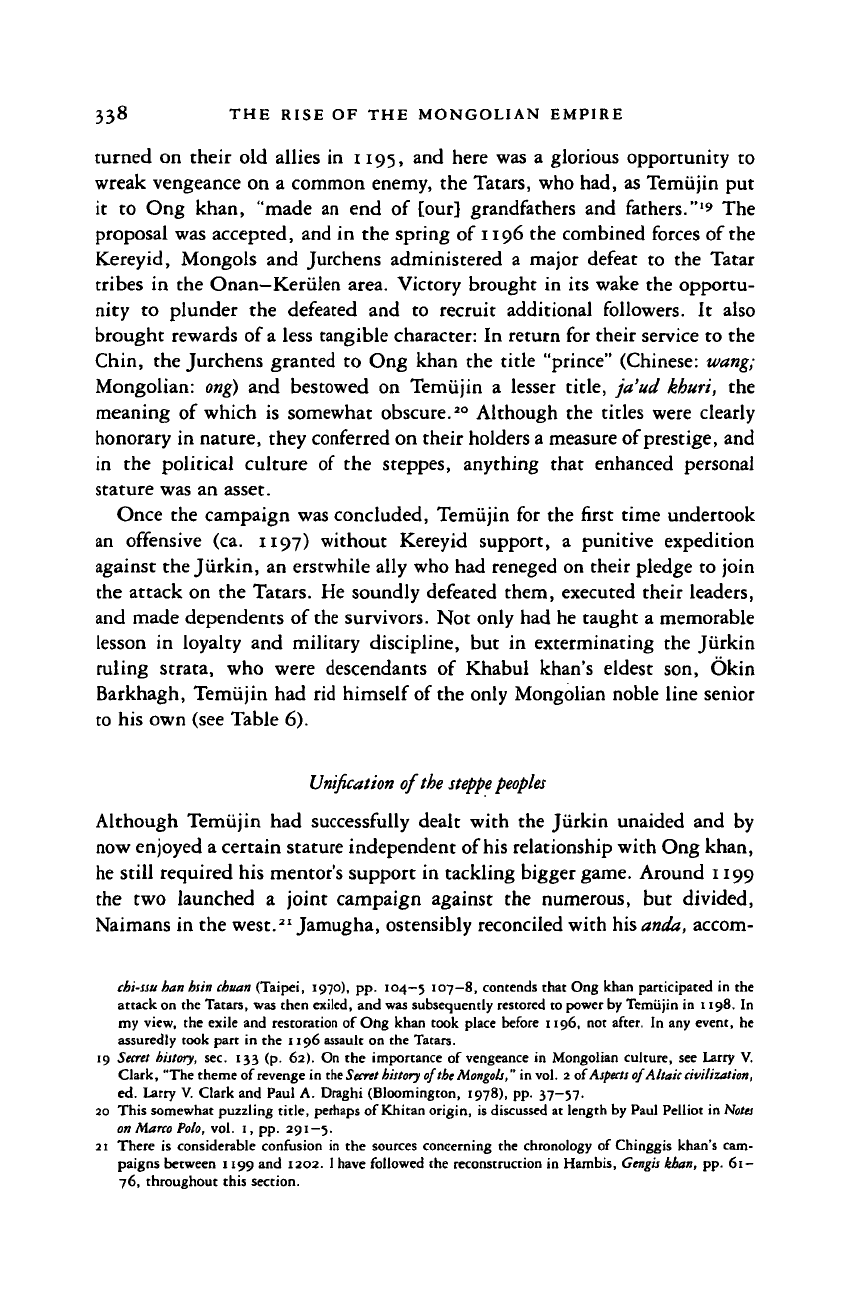
338 THE RISE OF THE MONGOLIAN EMPIRE
turned on their old allies in 1195, and here was a glorious opportunity to
wreak vengeance on a common enemy, the Tatars, who had, as Temiijin put
it to Ong khan, "made an end of [our] grandfathers and fathers."'
9
The
proposal was accepted, and in the spring of 1196 the combined forces of the
Kereyid, Mongols and Jurchens administered a major defeat to the Tatar
tribes in the Onan—Keriilen area. Victory brought in its wake the opportu-
nity to plunder the defeated and to recruit additional followers. It also
brought rewards of
a
less tangible character: In return for their service to the
Chin, the Jurchens granted to Ong khan the title "prince" (Chinese: wang;
Mongolian:
ong)
and bestowed on Temiijin a lesser title, ja'ud khuri, the
meaning of which is somewhat obscure.
20
Although the titles were clearly
honorary in nature, they conferred on their holders a measure of prestige, and
in the political culture of the steppes, anything that enhanced personal
stature was an asset.
Once the campaign was concluded, Temiijin for the first time undertook
an offensive (ca. 1197) without Kereyid support, a punitive expedition
against the Jiirkin, an erstwhile ally who had reneged on their pledge to join
the attack on the Tatars. He soundly defeated them, executed their leaders,
and made dependents of
the
survivors. Not only had he taught a memorable
lesson in loyalty and military discipline, but in exterminating the Jiirkin
ruling strata, who were descendants of Khabul khan's eldest son, Okin
Barkhagh, Temiijin had rid himself of the only Mongolian noble line senior
to his own (see Table 6).
Unification of the
steppe peoples
Although Temiijin had successfully dealt with the Jiirkin unaided and by
now enjoyed a certain stature independent of his relationship with Ong khan,
he still required his mentor's support in tackling bigger game. Around 1199
the two launched a joint campaign against the numerous, but divided,
Naimans in the west.
21
Jamugha, ostensibly reconciled with
h'isanda,
accom-
chi-ssu ban hsin chuan (Taipei, 1970), pp. 104—; 107—8, contends that Ong khan participated in the
attack on the Tatars, was then exiled, and was subsequently restored to power by Temiijin in 1198. In
my view, the exile and restoration of Ong khan took place before 1196, not after. In any event, he
assuredly took part in the 1196 assaulc on the Tatars.
19 Secret history, sec. 133 (p. 62). On the importance of vengeance in Mongolian culture, see Larry V.
Clark, "The theme of revenge in the
Secret
history ofthe
Mongols,"
in vol. 2 of
Aspects
of Altaic civilization,
ed.
Larry V. Clark and Paul A. Draghi (Bloomington, 1978), pp. 37—57.
20 This somewhat puzzling title, perhaps of Khitan origin, is discussed at length by Paul Pelliot in
Notes
on Marco Polo, vol. 1, pp. 291—5.
21 There is considerable confusion in the sources concerning the chronology of Chinggis khan's cam-
paigns between 1199 and 1202. I have followed the reconstruction in Hambis, Gengis khan, pp. 61-
76,
throughout this section.
Cambridge Histories Online © Cambridge University Press, 2008
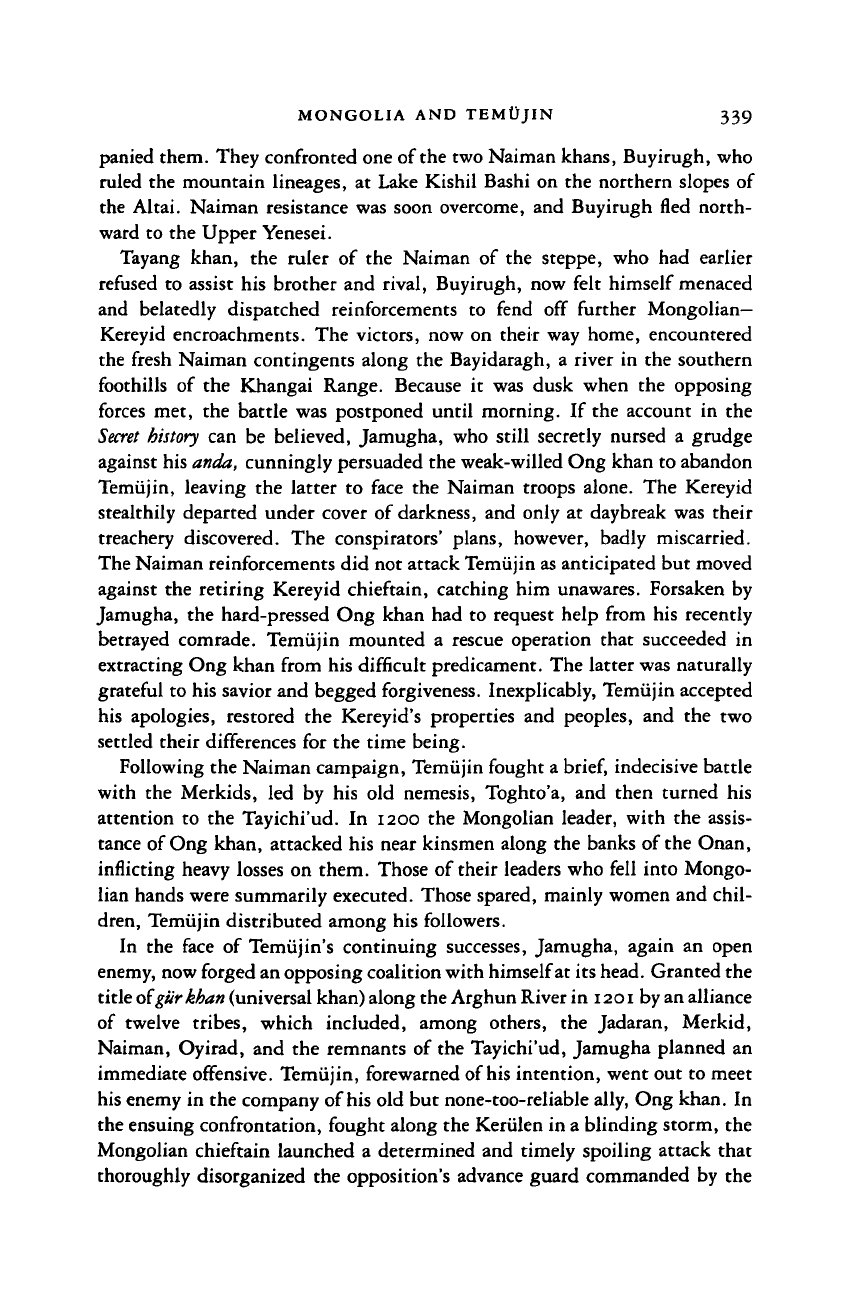
MONGOLIA AND TEMOjIN 339
panied them. They confronted one of
the
two Naiman khans, Buyirugh, who
ruled the mountain lineages, at Lake Kishil Bashi on the northern slopes of
the Altai. Naiman resistance was soon overcome, and Buyirugh fled north-
ward to the Upper Yenesei.
Tayang khan, the ruler of the Naiman of the steppe, who had earlier
refused to assist his brother and rival, Buyirugh, now felt himself menaced
and belatedly dispatched reinforcements to fend off further Mongolian—
Kereyid encroachments. The victors, now on their way home, encountered
the fresh Naiman contingents along the Bayidaragh, a river in the southern
foothills of the Khangai Range. Because it was dusk when the opposing
forces met, the battle was postponed until morning. If the account in the
Secret history
can be believed, Jamugha, who still secretly nursed a grudge
against his
anda,
cunningly persuaded the weak-willed Ong khan to abandon
Temiijin, leaving the latter to face the Naiman troops alone. The Kereyid
stealthily departed under cover of darkness, and only at daybreak was their
treachery discovered. The conspirators' plans, however, badly miscarried.
The Naiman reinforcements did not attack Temiijin as anticipated but moved
against the retiring Kereyid chieftain, catching him unawares. Forsaken by
Jamugha, the hard-pressed Ong khan had to request help from his recently
betrayed comrade. Temiijin mounted a rescue operation that succeeded in
extracting Ong khan from his difficult predicament. The latter was naturally
grateful to his savior and begged forgiveness. Inexplicably, Temiijin accepted
his apologies, restored the Kereyid's properties and peoples, and the two
settled their differences for the time being.
Following the Naiman campaign, Temiijin fought a
brief,
indecisive battle
with the Merkids, led by his old nemesis, Toghto'a, and then turned his
attention to the Tayichi'ud. In 1200 the Mongolian leader, with the assis-
tance of Ong khan, attacked his near kinsmen along the banks of the Onan,
inflicting heavy losses on them. Those of their leaders who fell into Mongo-
lian hands were summarily executed. Those spared, mainly women and chil-
dren, Temiijin distributed among his followers.
In the face of Temiijin's continuing successes, Jamugha, again an open
enemy, now forged an opposing coalition with himself at its
head.
Granted the
title oigiir
khan
(universal khan) along the Arghun River in 1201
by
an alliance
of twelve tribes, which included, among others, the Jadaran, Merkid,
Naiman, Oyirad, and the remnants of the Tayichi'ud, Jamugha planned an
immediate offensive. Temiijin, forewarned of
his
intention, went out to meet
his enemy in the company of
his
old but none-too-reliable ally, Ong khan. In
the ensuing confrontation, fought along the Keriilen in a blinding storm, the
Mongolian chieftain launched a determined and timely spoiling attack that
thoroughly disorganized the opposition's advance guard commanded by the
Cambridge Histories Online © Cambridge University Press, 2008
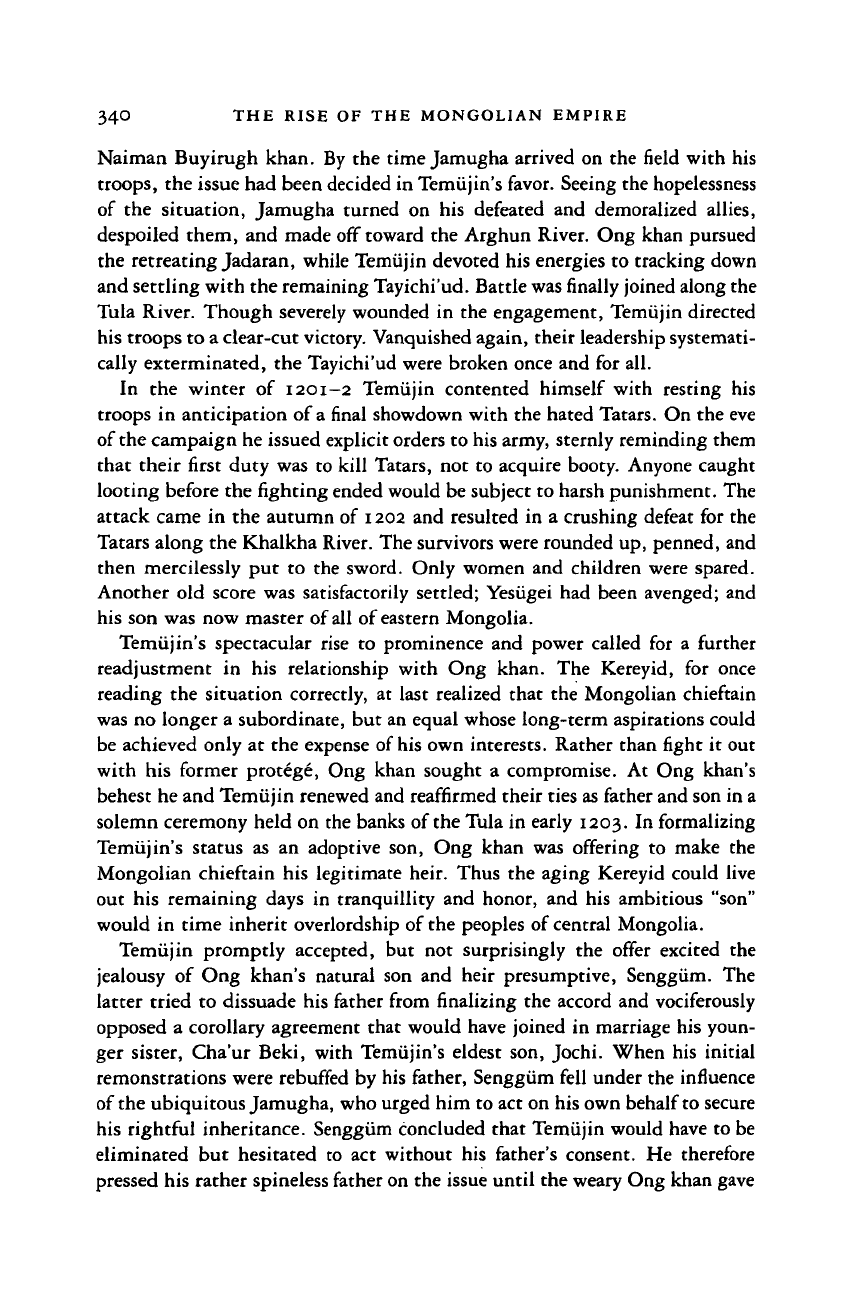
34O THE RISE OF THE MONGOLIAN EMPIRE
Naiman Buyirugh khan. By the time Jamugha arrived on the field with his
troops, the issue had been decided in Temiijin's favor. Seeing the hopelessness
of the situation, Jamugha turned on his defeated and demoralized allies,
despoiled them, and made off toward the Arghun River. Ong khan pursued
the retreating Jadaran, while Temiijin devoted his energies to tracking down
and settling with the remaining Tayichi'ud. Battle
was
finally joined along the
Tula River. Though severely wounded in the engagement, Temiijin directed
his troops to a clear-cut victory. Vanquished again, their leadership systemati-
cally exterminated, the Tayichi'ud were broken once and for all.
In the winter of 1201-2 Temiijin contented himself with resting his
troops in anticipation of
a
final
showdown with the hated Tatars. On the eve
of the campaign he issued explicit orders to his army, sternly reminding them
that their first duty was to kill Tatars, not to acquire booty. Anyone caught
looting before the fighting ended would be subject to harsh punishment. The
attack came in the autumn of 1202 and resulted in a crushing defeat for the
Tatars along the Khalkha River. The survivors were rounded up, penned, and
then mercilessly put to the sword. Only women and children were spared.
Another old score was satisfactorily settled; Yesiigei had been avenged; and
his son was now master of
all
of eastern Mongolia.
Temiijin's spectacular rise to prominence and power called for a further
readjustment in his relationship with Ong khan. The Kereyid, for once
reading the situation correctly, at last realized that the Mongolian chieftain
was no longer a subordinate, but an equal whose long-term aspirations could
be achieved only at the expense of his own interests. Rather than fight it out
with his former protege, Ong khan sought a compromise. At Ong khan's
behest he and Temiijin renewed and reaffirmed their ties as father and son in a
solemn ceremony held on the banks of
the
Tula in early 1203. In formalizing
Temiijin's status as an adoptive son, Ong khan was offering to make the
Mongolian chieftain his legitimate heir. Thus the aging Kereyid could live
out his remaining days in tranquillity and honor, and his ambitious "son"
would in time inherit overlordship of the peoples of central Mongolia.
Temiijin promptly accepted, but not surprisingly the offer excited the
jealousy of Ong khan's natural son and heir presumptive, Senggiim. The
latter tried to dissuade his father from finalizing the accord and vociferously
opposed a corollary agreement that would have joined in marriage his youn-
ger sister, Cha'ur Beki, with Temiijin's eldest son, Jochi. When his initial
remonstrations were rebuffed by his father, Senggiim fell under the influence
of
the
ubiquitous Jamugha, who urged him to act on his own behalf
to
secure
his rightful inheritance. Senggiim concluded that Temiijin would have to be
eliminated but hesitated to act without his father's consent. He therefore
pressed his rather spineless father on the issue until the weary Ong khan gave
Cambridge Histories Online © Cambridge University Press, 2008
